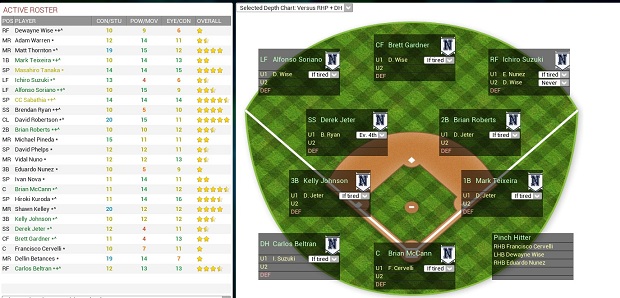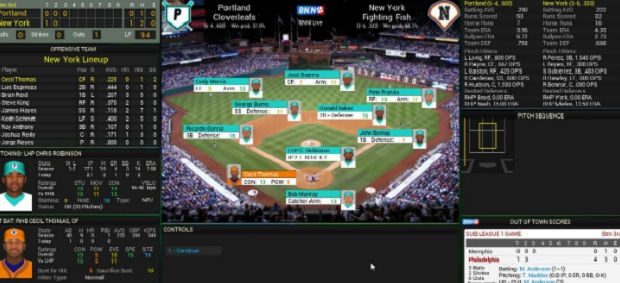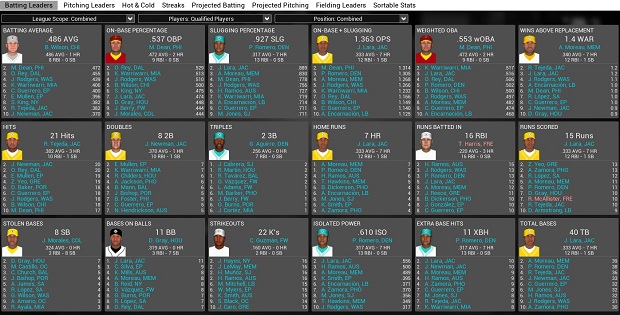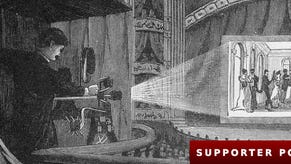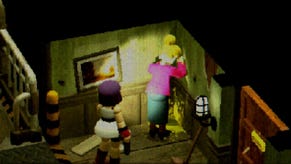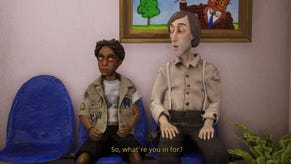Wot I Think: Out Of The Park Baseball 15
Home, sweet home
Out Of The Park Baseball doesn’t simulate a sport, it simulates a world. Tracking franchises, coaches, leagues, rosters and rules, the game is capable of generating a fictional world built around America’s Pastime. Previous releases have been among the most impressively simulated and highly regarded sports management games ever released, and the new season’s release doesn’t disappoint, despite some undercooked new features. Here’s wot I think.
In my current save, the Manchester Buzzards are leading the British Baseball League’s (BBL) Northern Division as we head toward the 2027 play-offs. The sport really took off in Britain between 2015 and 2020, when the eight team league doubled in size, expanding to new cities including Glasgow, Swansea and Brighton. I’m faced with a dilemma now – do I continue to grow the BBL until every county has a team or do I stick with the sixteen team structure for a decade or two? I could even bring in some European competition. Maybe I could create a Champions League equivalent by editing the post-season a little?
These are the things I think about when I play Out Of The Park Baseball. Some people buy the game and stick with the comprehensive rosters included for various national leagues, playing either alone or in life-consuming multiplayer competitions that span decades. Baseball, in a way that seems curiously suited to American sports, encourages the construction of dynasties rather than individual teams and that makes long-form campaigns a beautiful challenge in their own right.
The draft system is perhaps responsible, helping to emphasise the importance of filling gaps where players have grown old or ineffective. The Association Football transfer market, at the highest levels, often seems like dining out on gourmet cuisine – you make your pick because the people at the next table will be impressed even if you’ve already eaten six swan tongue wafers for breakfast. The draft is more like a buffet. You might get stuck at the back of the line but usually there will still be some of the good stuff left, even if it’s the slightly cold crusty portion that everybody else has pushed to one side.
Point is, your plate (and your team) will have the variety required rather than being overloaded with carbs. It’s entirely possible to spend more time on the draft – planning and partaking – as it is on an entire season of play. For those who don’t know the sport, in the MLB, one of the defining features of baseball is the number of games played in a season. There’s precious little downtime with 162 games to survive per team in the regular season (before playoffs and the World Series) and the idea of managing each game, play-by-play, is fearsome. This immediately makes Out Of The Park a very different proposition to most sports management games that capture my attention.
In Football Manager, I delegate almost every job that doesn’t involve direct tactical instructions and team-building. I spend my time pausing matches and considering substitutions , watching the movement of individual players and tweaking their instructions as the minutes pass. Baseball doesn’t allow for that level of observation. Games can be watched in their entirety but because they’re stop-start affairs, divided into plays much more neatly and decisively than football (in the English sense; although more so than the fragmentary American Football too), there’s less room for instructions screamed from the touchline.
During a ball game, you can direct the out-field to play tighter, yank struggling pitchers out of the game and relay instructions to aim for certain plays. Influence is limited though – who was the astute observer who noted that a baseball coach only affects the result of a handful of games during a season? – and the team operate like a machine, made up of an arcane series of stats. As far as I’m concerned, machines made of stats are just about the most perfect example of PC gaming’s attractions. The challenge and joy of the game is in setting up those machines, ensuring that the cogs and gears are functioning optimally, and that replacements are ready to counter inevitable breakdowns.
To do so requires a working knowledge of the stats. Baseball has two languages, both of which are captured on-screen with beautiful precision. The numbers and abbreviations – OPS, OBP, LOB – tell the story of each game and each player. Box scores are concise summaries of the previous hours of (in)action and when you have a grasp of the terminology, scanning through those screens and player cards provides all the information needed to improve your team. Or at least to make the attempt.
Baseball’s other language is of ‘peanuts and Cracker Jack’, of ‘frozen ropes’ and ‘fencebusters’. For pitchers, it might involve ‘painting the corners’ or ‘throwing a pill’, and for batters the ignominy of a ‘Golden Sombrero’*. If every one of those terms left you feeling confused, I’d wonder how it is that you’ve never heard of a peanut but if the vast majority sound like gibberish, that’s perfectly normal.
The slang and terminology surrounding the game have developed over the decades of its life, and through the years the National Pastime has been interwoven with American history and culture. I don’t think there’s a better opening to an American novel than Underworld’s view of the infamous Giants-Dodgers game of 1951, in which every corner of every borough of New York is represented. From Sinatra to truant Cottie Martin, all of life is at the game to witness, first-hand, the shot heard ‘round the world.
DeLillo extracts the moments around the myth, while the sportswriters and announcers of the day exploded the moment into a myth. In the New York Herald Tribune, Red Smith described the game’s ending: "Now it is done. Now the story ends. And there is no way to tell it. The art of fiction is dead. Reality has strangled invention. Only the utterly impossible, the inexpressibly fantastic, can ever be plausible again." A masterclass of justified hyperbole**. A huge part of Out Of The Park’s appeal is the potential to create your own historical moments, building legacies and a Hall of Fame from scratch.
The great difference between Football Manager and Out Of The Park – and they are the two most in-depth sports management simulators available – is the latter’s wide range of customisation options. Every historical season of MLB is playable, with the opportunity to diverge from reality, and fictional leagues can have any structure imaginable.
The initial set up, even if a real league is used, is nothing more than a starting point. Rules and franchises evolve over time. Teams can relocate and divisions can expand. All of this can occur dynamically but the player can also take the role of commissioner, controlling every aspect of the league and taking control of any team on the fly. That’s my favourite way to play, simulating and crafting history while watching for the unusual and the unexpected.
Like baseball, Out Of The Park is a game of long stretches in which little of importance happens. These are testing out periods, as well as challenges to endurance and concentration, and they’re punctuated by shocks and sparks of brilliance. Pitchers are the engines of their team, celebrated for persistence and perfection, while a faltering batter can be elevated to heroic status following a single extraordinary hit.
The flow of individual games, in simulated form at least, doesn’t lend itself to spectating as strongly as football but Out Of The Park’s brightest moments arise from season to season rather than moment to moment. Some of the advances in this new edition, the 3d ballparks in particular, weren’t integrated particularly well from the start but updates are regular and efficient. Pleasant as 3d depictions of an inches short home-run attempt are, they’re not the heart of the series.
The heart is the numbers and the superbly credible depiction of the world around the game. From emergent textual storylines following players through triumphs and tribulations to the improved interface, everything is geared toward the path from draft to hall of fame, and from the genesis of a new league to expansion, development and the establishment of new legends. Whether you want to watch the evolution of a league or take a direct hand, whether you want to control every spot on the roster or simply handle the big decisions, Out Of The Park is geared toward ease of use despite its complexity.
Everything is tracked, from day to day and year to year, and everything is easily accessible. For baseball fans, it's as perfect a simulation of the game as has ever existed and for sim fans who don't have the baseball bug, it might just be a window into an entire new word. My own love affair with baseball started with the book Moneyball and Out Of The Park was the next step, long before I grew attached to a team and lost the months from April onwards to late night live broadcasts from distant timezones.
*Strike out three times and you have a hatrick. Strike out for a fourth and you need a bigger hat.
*Not my favourite example though - I defer to A. Bartlett Giamatti: "It breaks your heart. It is designed to break your heart. The game begins in spring, when everything else begins again, and it blossoms in the summer, filling the afternoons and evenings, and then as soon as the chill rains come, it stops and leaves you to face the fall alone."


